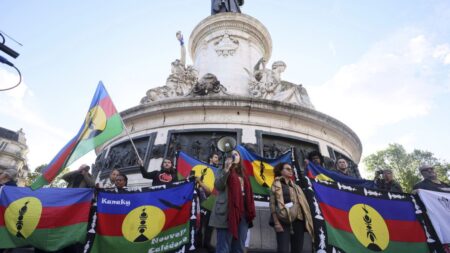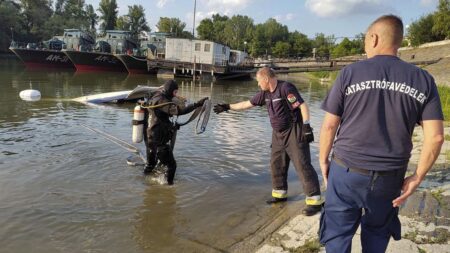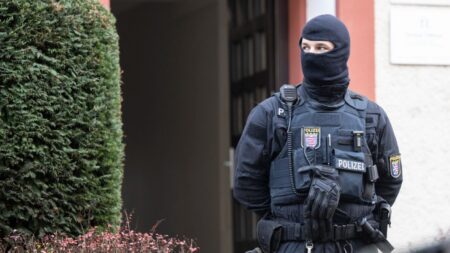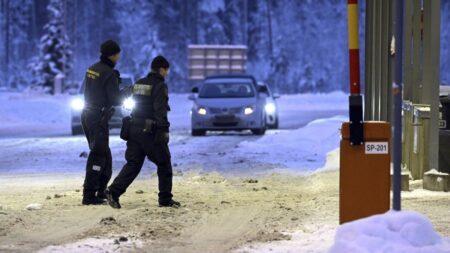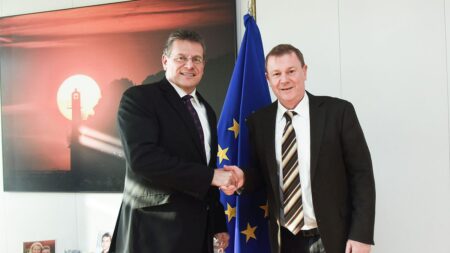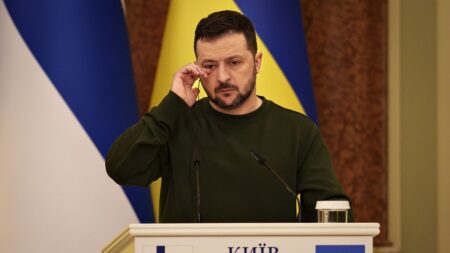German politician and defence veteran Marie-Agnes Strack-Zimmermann is set to join the race to head the EU executive, after she was fielded to be the lead candidate of Europe’s Liberal party (ALDE) in June’s ballot.
Strack-Zimmermann – who belongs to Germany’s Free Democratic Party (FDP), part of the country’s three-way governing coalition – was the only name put forward to lead ALDE’s electoral bid.
ALDE is one of the three political forces that make up the centrist Renew Europe group, home to liberal, pro-European political parties in the European Parliament.
A defence expert who has earned a reputation domestically for her outspoken criticism of Russia’s war against Ukraine, Strack-Zimmermann will be one of three candidates sent by Renew to battle it out ahead of June’s vote.
She chairs the Bundestag’s defence committee and has consistently pressured Chancellor Olaf Scholz to step up military support by delivering more ammunition and long-range weapons, including Taurus cruise missiles, to Kyiv.
Her nomination will be formalised with a vote by ALDE delegates during the Renew group’s campaign kick-off in Brussels on March 20. A spokesperson told Euronews that her nomination is all but guaranteed.
“ALDE Party believes Marie-Agnes has a strong and suitable profile that is needed to convey our liberal message in the European campaign for Europe to regain a competitive edge, for our citizens to regain trust in European institutions and to make Europe a safe place for its citizens,” the party said in a statement.
Its member parties include the likes of Estonian Prime Minister Kaja Kallas’ Estonian Reform Party, and Dutch caretaker Prime Minister Mark Rutte’s People’s Party for Freedom and Democracy.
The Renew Europe group is also home to two further political parties, the European Democratic Party (EDP) and French President Emmanuel Macron’s Renaissance party.
Each of its three political forces will field individual lead candidates ahead of June’s crunch ballot. The EDP has already nominated Sandro Gozi, a current member of the European Parliament, and Renaissance is mulling Valérie Hayer, who also chairs the Renew group in the European Parliament, as their choice.
A Renew spokesperson told Euronews that when all three parties convene in Brussels later this month, it is likely that Strack-Zimmermann will be endorsed as the lead pick from the three, likely to represent Renew Europe in electoral debates and lead the fight in electoral rallies.
All three parties will also pitch individual manifestos, but have agreed on common ’10 priorities’, due to be unveiled later this month.
But none of the three candidates is likely to have a shot at the Commission top job, with latest polls suggesting the Renew group could drop from third to fifth place in June’s vote, losing its kingmaker position to far-right groups.
Ursula von der Leyen, the lead candidate of the centre-right European People’s Party (EPP), is likely to sail unchallenged to secure a second term at the Commission’s helm.
‘Europe of freedom’
The confirmation came as the FDP party launched its electoral campaign ahead of the EU-wide vote, which takes place on June 9 in Germany. Strack-Zimmermann will also head its electoral list.
She has made defence and a free market economy the core tenets of her platform, vowing to ensure less bureaucracy, more individual freedoms and more security for Europeans.
In its manifesto, her party proposes further support to Ukraine so that it can “win the war and regain its territorial integrity”, a push for more free trade agreements, including with the US, a new EU ‘Bureaucracy Reduction Act’ and the legalisation of cannabis.
FDP leader Christian Lindner, who serves as Germany’s Finance Minister, said that the party’s campaign is “a double declaration of war” against those who are against European unification and those who want to make the EU a “bureaucracy trap.”
The party hopes the strong domestic profile Strack-Zimmermann has developed on defence policy in the context of Russia’s aggression can help buoy its support in the polls.
But with all three parties in Germany’s governing coalition struggling with some of the lowest approval ratings in their history, her party faces an uphill battle. Recent polls put the FDP at 5%, its lowest support rate since the 2021 federal election.
The FDP has also often sparked uproar in Brussels for last-minute attempts to veto key EU laws, including the phase-out of the combustion engine and, more recently, new rules forcing companies to vet business partners for environmental damage and human rights abuses.
Read the full article here



